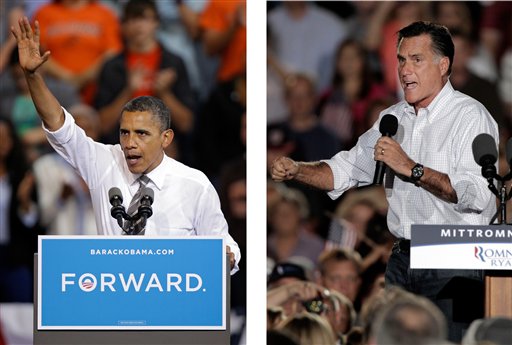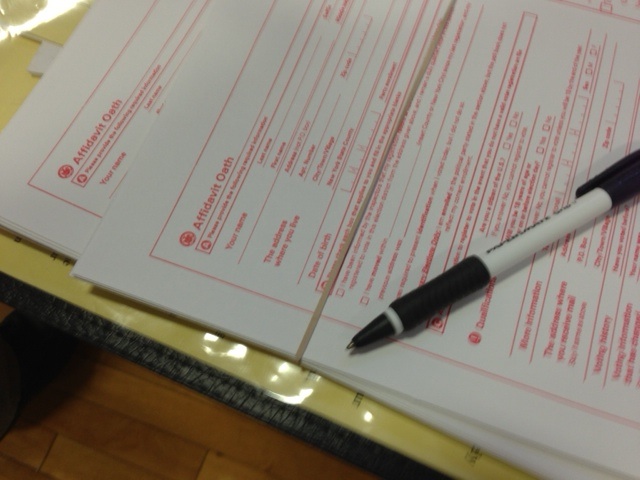

In these Sept. 26, 2012, file photos, President Barack Obama and Republican presidential candidate Mitt Romney both campaign in the battleground state of Ohio. (AP Photos)
When President Barack Obama and Republican challenger Gov. Mitt Romney step on the Hofstra University stage for their second debate Tuesday, they will be fielding questions from about a dozen Long Islanders still unsure who they’ll pick on Election Day.
The town-hall format forces the candidates to engage everyday Americans in addition to the moderator, CNN’s Candy Crowley, if they want to win over crucial undecided voters.
After months of watching attack ads barrage their TVs and hearing recycled stump speeches all summer long, the undecideds will get the opportunity to look the candidates in the eye and ask: How will you make my life better?
“It’s a high-wire act,” said independent political strategist Michael Dawidziak, a pollster and a former adviser to four Republican presidential nominees. “You gotta be smart, and personable and likeable and you gotta look that way and you gotta be that way—and it’s not easy.”
Town-hall debates are “folksy,” Dawidziak noted, predicting less mano-a-mano battles. But the style of debate may be the least of Obama’s worries.
Republicans cheered the president’s lackluster performance in his first match-up with Romney, while Democrats were mystified with what transpired that night. Obama has to make up for lost ground if he wants a chance in November.
Former New York State Assemblyman Jerry Kremer, now a Democratic strategist on LI, told the Press that with Tuesday’s debate focusing on foreign policy, the event at Hofstra may be Obama’s best chance to convince voters that a second term under his administration beats the alternative.
“This may be the defining debate of the three [debates] because a lot of people will be curious to see how the president upgrades his act,” Kremer said. “This is going to be his opportunity to do that.”
Dawidziak is also convinced that viewers will tune in for the Slugfest in Hempstead, even though recent history shows that the middle debate usually sees a slip in viewership.
“It’s kind of like [Muhammad] Ali and [Joe] Frazier two,” he said, referencing the rematch between the two boxing heavyweights in 1974. “I think people are going to be tuning in to see how they do the second time around.”
So what should the nation expect from both candidates?
Kremer believes the president should boast his accomplishments over the last four years.
“This is an opportunity for him to crow about the kind of numbers that he is getting,” Kremer said, referring to recent jobless numbers that fell below 8 percent for the first time in four years. “I just think that he would be foolish not to do some chest beating about how the numbers keep going down and talking about the number of new jobs he’s created since he became president.”
Obama should also take the time to explain why he thinks America is better off than when he was elected in 2008, Kremer added, a question the Romney camp has posed throughout the campaign to voters.
“It’s one thing to say, ‘I inherited a mess,’” he said. “It’s another thing to say, ‘This is how I cleaned it up.’”
Dawidziak compared Obama’s listless debate performance to that of George H.W. Bush in 1992, saying the former president loved his job, but didn’t enjoy campaigning to keep it.
“From Obama’s point of view, he’s gotta come back and look like he’s the president,” Dawidziak said. “He’s gotta look like he’s in charge, look like he’s in command of the facts, and beyond that he has to get back to that likeable, lovable Obama.”
Romney is not the first challenger to beat the incumbent in the premiere debate, so it’s important to keep the pressure on and keep the message on the economy, Dawidziak said.
“If I were Romney I wouldn’t use the 8 percent number,” he added. “I would use the 15 percent number, the number of people out of work…that’s the real number we should be paying attention to.”
His advice: “Whatever they ask you, somehow tie that answer to the economy.”
Voters and pundits will also be tuning in to see if Romney follows up his strong performance in Colorado, when he was widely viewed as the winner of the first debate.
“He has to continue to show that he can share the stage with the leader of the free world,” Dawidziak said. “And he’s gotta make sure he comes off, not being snarky, but aggressive.”
Both strategists said viewers should pay attention for a key moment that could tip the scale to one candidate.
“A defining moment could be based upon the question that was asked,” said Dawidziak. “If the right person asks the right question that strikes a chord and one of them handles the question brilliantly or terribly, that could be a defining moment.”
Added Kremer: “This is now or never.”




